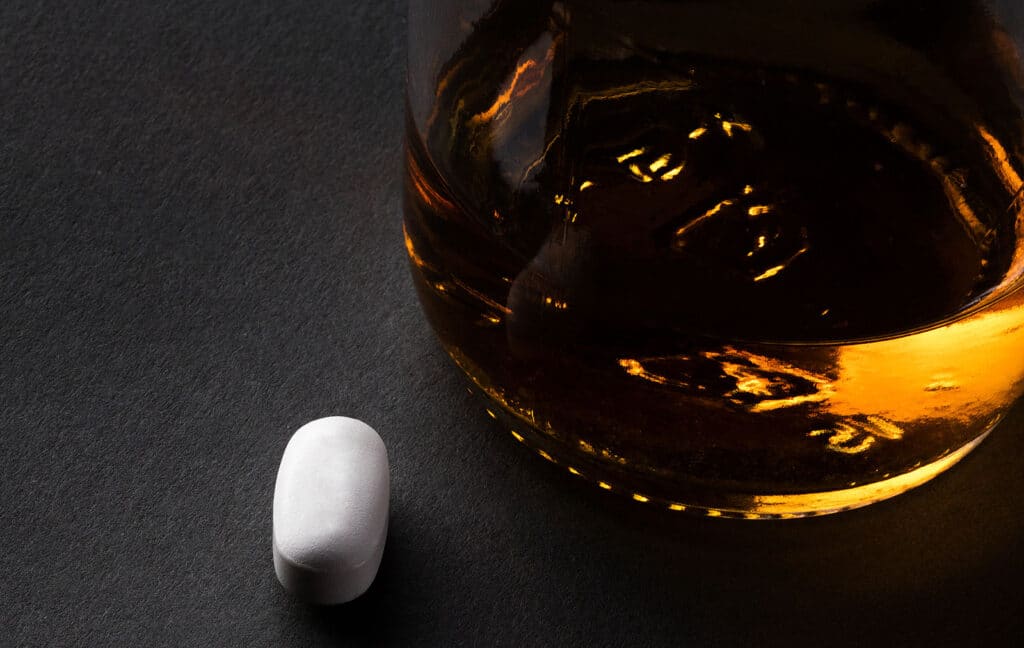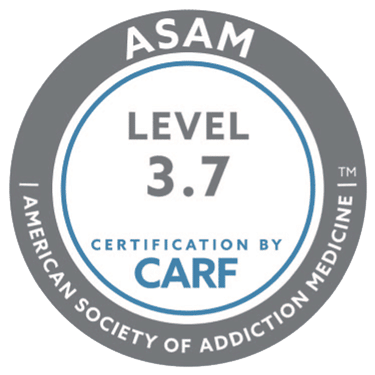Alcoholism is a disorder characterized by chronic craving and dependence on alcohol, both physical and psychological.
In other words, an alcoholic needs to drink liquors in order to function properly and fail to cut back or stop its consumption at will.

While alcoholism is one of the most challenging types of substance abuse disorders, it is still manageable if you use the right techniques to address it.
In today’s article, we’ll walk you through everything you need to know about this disorder, including symptoms, signs, and alcoholism treatment.
What Makes Alcohol Addictive?
Alcohol works by interacting with gamma-aminobutyric acid (GABA) receptors in the brain, which are responsible for inhibitory functions and reducing excitability.
Compared to many other chemicals and substances, alcohol isn’t highly addictive on its own, which is why not everyone who drinks alcohol becomes immediately addicted to it.
However, the psychological dependence on alcohol is what makes it highly addictive. This is because alcohol can provide temporary relief from some types of life stressors, which encourages some people to abuse this property as a coping mechanism.
Besides psychological dependence, alcohol also stimulates the release of endorphins and dopamine in the brain, which are responsible for feelings of pleasure and pain relief.
This ends up developing a habit and makes it very difficult to fulfill responsibilities without being under the influence of alcohol.
Is Alcoholism Common?
While heavy drinking and problem drinking is extremely bad for your health, a heavy drinker isn’t necessarily an alcoholic.
Instead, being an alcoholic depends on the inability to stop it on demand and being able to function without drinking. For that reason, consumption statistics don’t accurately reflect how common alcoholism is.
With that being said, and despite not being highly addictive, alcohol remains one of the most commonly abused substances around the globe, and estimates show that around 107 million people suffer from alcohol use disorder(AUD)
Additionally, alcoholism is associated with a higher mortality rate than many addictive substances.
In fact, the World Health Organization revealed that over 3 million people die every year because of alcoholism, whether in accidents or due to health complications.
The Significance of Treating Alcoholism
As previously established, alcoholism comes with a lot of negative consequences in various walks of life.
For example, recent studies found a correlation between alcoholism and developing psychological disorders. For instance, a 2012 study found that alcoholics are much more likely to suffer from depression and anxiety.
A study by Cambridge University also shows that alcohol use disorders can lead to social anxiety and lack of self-esteem, which can affect both personal and professional lives.
In addition to impacting the ability to fulfill daily tasks and responsibilities, alcoholism is also bad for general health, and a recent study found that it’s a contributing factor to as many as 30 underlying health conditions.

What Are the Causes of Alcoholism?
Since alcoholism is mainly derived from psychological dependence, the causes behind every alcoholic can be somewhat unique.
In fact, there are several factors that can cause alcoholism or increase its likeness from one person to another. These aspects include:
Genetics and Family History
Some genetic factors may make some individuals more likely to develop alcohol dependence, especially if there’s a family history of alcoholism.
For instance, those who naturally need more alcohol to reach the desired level of drunkness are much more likely to develop a drinking disorder, according to studies.
Stress
It goes without saying that post-traumatic stress disorder is one of the main reasons why some people develop alcohol dependence.
In fact, scientific data supports these claims with a noticeable increase in population alcoholism levels following disasters and terror attacks.
Early Start
The age at which you start drinking can greatly influence your predisposition to alcoholism. This is believed to be due to children’s inability to control their impulses in comparison to grown-ups.
In fact, one study found that teenagers who started drinking at the age of 15 are much more likely to develop alcoholism as they grow older, especially in the presence of life stressors.
Easy Access to Liquors
Easy access to liquors can take many forms, including availability, affordability, ease of procurement, variety, culture, etc.
For instance, in Alaska, there was a noticeable drop in Alcohol consumption and reported cases of alcoholism after increasing the alcohol tax in the state.
Psychological Disorders
Many psychological and mental disorders can cause severe alcohol abuse and dependence.
For example, the soothing factor of alcohol is one of the most common ways people cope with depression. As a result, drinking develops from a coping method to a functioning necessity.
Low self-esteem is also a common factor for compulsive drinking, especially to avoid peer pressure.
Alcoholism Risk Factors
In addition to the random and primary reasons behind alcoholism, there are some additional risk factors that greatly increase the likelihood of developing an alcohol abuse disorder, including:
- Having a traumatic history
- Having a parent or a close family member who had drinking problems
- Being surrounded by heavy drinkers whether they’re family or friends
- Living in a region where alcohol consumption regulations are weakly enforced

What Are the Symptoms of Alcoholism?
Repeated and prolonged alcohol use can have a wide range of negative effects on an individual’s mental and physical health.
In this section, we’ll take a closer look at the signs and symptoms of alcoholism, including acute and chronic alcohol abuse.
Signs of Alcohol Addiction
- The inability to stop or limit the amount of alcohol you consume daily with several failed attempts
- Always craving alcohol when you’re not drinking
- Ending up drinking more alcohol than originally intended, especially on frequent occasions.
- Giving up on important activities and events that are important to spend time drinking
- Failing to
- daily obligations and responsibilities because of drinking, whether at home, work, or school
- Developing tolerance to the regular dose of alcohol
- Consuming alcohol in situations that deeply endanger your safety, such as driving
- Continuing to use alcohol even when it caused you personal or professional issues, and against the doctor’s advice to cut back or stop alcohol
- Continuing to consume alcohol even if it will affect your loved ones, such as drinking while pregnant
Symptoms of Alcohol Abuse
For a grown adult, the toxic dose of alcohol is 5 mg/dL, which leads to alcohol poisoning, which is a serious and potentially fatal condition that requires immediate medical attention.
However, consuming large amounts of alcohol over a short or long period of time can cause several health problems, such as:
- Injuries and accidents due to intoxication and lack of proper judgment
- Increased rate of aggression and violence
- Alcoholic liver disease, which develops into liver fibrosis
- Increased risk of heart problems, such as high blood pressure, strokes, and heart failure.
- Digestive problems
- Increased risk of different types of cancers, such as breast, esophagus, pharynx, liver, mouth, and colorectal cancer.

What Are the Common Treatment Options for Alcoholism?
There are various methods that are proven effective when it comes to treating alcoholism. In the following section, we’ll take a closer look at them:
1. Medical Detoxification
Detox is the first step to take while treating alcoholism. In this stage, alcohol is flushed out of the body to prepare individuals for treatment. It’s also during that stage that withdrawal symptoms appear.
Depending on how severe the condition is, to stop drinking or cutting off alcohol can be done gradually or fully, depending on doctors’ and treatment providers’ recommendations.
2. Behavioral Therapy
Behavioral therapy is an essential part of addiction treatment because it establishes impulse control, which gives an individual the ability to overcome the urge to drink, and it comes in different types:
Cognitive Behavioral Therapy:
This therapy technique helps in reducing anxiety, which is one of the main triggers that push individuals to consume alcohol excessively. It’s highly effective for those who developed dependence after traumatic events.
Dialectical Behavioral Therapy
This one is an advanced form of behavioral therapy that mainly targets impulse control, especially for those who suffer from other psychological conditions along with addiction.
Motivational Interviewing
As the name suggests, this technique helps individuals find the motivation necessary to maintain their sobriety, especially those who weren’t committed to change.
3. Support Groups
Group therapy or Support groups are extremely effective in alcoholism treatment because they help alcoholics overcome their isolation from society by being surrounded by individuals with similar experiences. These support groups can take two forms:
- 12-Step Programs: Such as Alcoholics Anonymous(Al-anon), which follows specific guidelines and relies on counseling and a religious amendment to gather the power to stay sober.
- Non-12-Step Programs: Also follows specific guidelines but concentrates on personal responsibility and peer support to control impulses and avoid triggers.
4. Medications
Some medications are approved by the FDA to treat alcohol dependence by reducing cravings or deterring them, such as:
- Disulfiram: Produces unpleasant symptoms when combined with alcohol, which encourages individuals to avoid drinking.
- Naltrexone:Reverses the effects of alcohol, which helps in reducing cravings. (Also used in treating opioid addiction using the same effect)
- Acamprosate: Blocks alcohol withdrawal symptoms, which helps recently treated alcoholics avoid drinking again.
How to Treat Alcoholism
Now that you know more about the treatment methods of alcoholism, here’s a brief overview of the steps of treating alcoholism.
1. Seek Counseling and Professional Help
As previously established, chronic alcoholism is associated with a variety of health problems that may require medical attention.
Additionally, addiction is extremely hard to get over on your own, which is why seeking help from health professionals greatly improves the chances of successful treatment.
Besides providing the support and expertise necessary to continue treatment, addiction treatment centers provide a safe zone to recuperate and recover away from triggers.
2. Treat Underlying Conditions
A lot of people consume alcohol as a method to cope with traumas or due to psychological problems (such as PTSD).
In fact, some reports found that over 33% of heavy drinkers developed their habit after surviving disasters, illnesses, and accidents.
In that case, seeking counseling from your primary healthcare provider can also help you find the right support to overcome these triggers, which greatly helps with the efforts to stay sober.
3. Create a Personalized Plan for Treatment
Since there are various risk factors that can trigger a drinking habit that leads to alcohol dependence, the right method of treatment can vary from one person to another.
After all, alcohol dependence is deeply psychological, so the treatment must involve a personalized element to treat these underlying conditions.
In that case, using the right combination of treatment options can greatly improve the chances of successful treatment.
In fact, some studies found that treatment personalization and creating custom plans can heavily impact the success rate of treatment.
4. Learn About Alcoholism Treatment Challenges and Prepare for Them
In addition to being one of the most common types of addiction, alcoholism also has a high relapse rate due to triggers.
For that reason, preparing for the challenges that a recently treated individual might stumble across is quite essential. Among the most common alcoholism challenges are:
- Uncomfortable withdrawal symptoms that may discourage patients from continuing treatment, especially for those with very high tolerance to alcohol
- Avoiding triggers and other underlying factors that may push chronic alcoholics to relapse and drink again, especially in the case of severe trauma
- Treating alcoholism while suffering from coexisting conditions, such as mental illness and other conditions that require special medication, especially if those treatments interfere with alcoholism medications.
5. Use Methods to Stay Committed to Treatment
According to recent studies and reports, around 20% to 50% manage to achieve short-term remission and overcome their addiction.
In other words, 50% to 80% of alcoholics may succumb to triggers and go back to drinking after treatment.
That’s why creating a special treatment plan that helps you fight the urge to relapse is quite essential, and according to the same study, it greatly helps in increasing the success rate of the treatment.
Wrap Up
Alcohol abuse disorder is a serious form of addiction that can cause a wide variety of short and long-term symptoms. The National Institute on Alcohol Abuse and Alcoholism (NIAAA) describes alcohol use disorder as “an impaired ability to stop or control alcohol use despite adverse social, occupational, or health consequences.”
With that being said, treating alcoholism is entirely possible as long as you set out a proper plan for recovery, including personalized goals and motivations as well as methods to commit to your sobriety to avoid relapsing.
FAQ
What is alcoholism treatment?
How do I know if I need alcoholism treatment?
What types of therapies are used in alcoholism treatment?
Are medications used in alcoholism treatment?
How long does alcoholism treatment last?
Is inpatient or outpatient treatment better for alcoholism?
How much does alcoholism treatment cost?
How do I find an alcoholism treatment program?
Can alcoholism be cured?
What can I do to support a loved one in alcoholism treatment?







